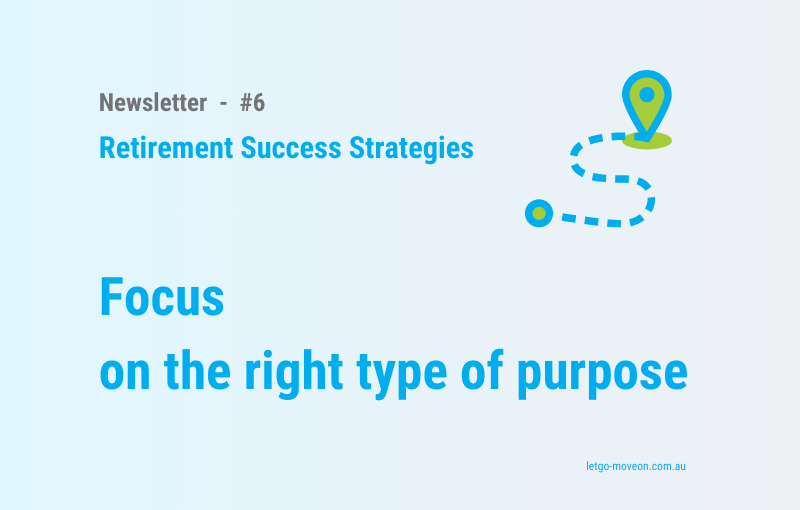Retirement is a significant transition.
After years of structure, responsibilities, and goals tied to work, many of us ask, “What now?”
The search for purpose can feel exciting – but it can also feel overwhelming.
We hear or read that a strong sense of purpose is linked to better health, longer life, and greater happiness.
But what exactly does the term ‘purpose’ mean? And how can we ‘find new purpose’ when we enter retirement?
From my clients and from my own experience, I know that searching for purpose can leave us feeling stressed, lost, or inadequate.
That’s why I got very excited when I found an article (Jordan Grumet, ‘The Purpose Paradox’, Psychology Today, 01-2025.) offering an overview of
The concepts of purpose anxiety, Big-P Purpose, and little-p purpose
After studying and applying the concepts, I still haven’t found a final definition of my personal purpose. But I am making progress, and I no longer feel anxious or stressed about the search.
I trust you will also find the concepts helpful.
Let’s break them down and see how they can help us ‘find’ purpose:
Purpose Anxiety: The struggle to “find” meaning
Purpose anxiety is the frustration, stress, or even sadness that comes from trying to “find” a grand, singular purpose. We may believe that retirement should come with a clear mission or that we must reinvent ourselves to stay relevant.
If you have ever thought, “I should be doing something more meaningful, but I don’t know what,” you have experienced purpose anxiety.
The good news?
There’s no single, perfect purpose waiting to be discovered!
Instead, we can redefine purpose more simply and practically by differentiating two types of purpose.
Big-P Purpose versus little-p purpose
-
- Big-P Purpose refers to grand, goal-driven aspirations – writing a bestselling book, starting a nonprofit, or leaving a lasting legacy. While these goals can feel fulfilling, they can also feel daunting, especially if they seem out of reach. And they can be hard to ‘find’ and define.
- Little-p purpose is different. It is about the small, meaningful activities that bring joy and fulfilment in everyday life. Teaching a grandchild how to cook, volunteering at a local shelter, exploring an unknown area of your town, or learning a new skill can all be sources of purpose.
Many of us have spent our careers chasing Big-P Purpose – working hard, building something significant, achieving milestones.
But retirement offers a chance to shift our focus to little-p purpose, where meaning comes from the process rather than the outcome.
Practical ways to find purpose in retirement
Instead of waiting for a grand revelation, we can create purpose in small, intentional ways.
Here are some suggestions:
#1 – Revisit what you enjoyed before work took over
Think back to activities that once brought you joy. Maybe it was painting, gardening, writing, reading, travelling, or hiking. Retirement is a chance to return to those interests without time pressure and with new energy and engagement.
#2 – Shift from achievement to engagement
Instead of asking, “What should I accomplish?” ask, “What do I enjoy doing? How do I want to spend the day?” You don’t need to build something big to make a difference – small, consistent actions matter just as much – if they matter to you.
#3 – Experiment without success expectation
Try new things without worrying about mastery or impact. Take a class, join a group, or explore a hobby. The goal could be not to be the best but to stay engaged and curious. And if you no longer enjoy the activity, try something else!
#4 – Invest in relationships that matter to you
Purpose doesn’t have to be tied to individual success. Helping others can be fun instead of a responsibility; mentoring younger people can also help you grow; simply strengthening existing friendships can bring deep fulfilment.
#5 – Give yourself permission to change your mind
Your sense of purpose will evolve. What excites you today may no longer feel exciting tomorrow, and that is okay. Decide to let go of the need to define it perfectly – just keep moving toward what feels meaningful to you right now.
Maybe purpose in retirement is not about chasing something grand or creating life-changing experiences.
Maybe it’s about finding joy in the present, engaging with what matters to us in this moment, and embracing the freedom to explore various interests and passions without pressure.
I suggest we empower ourselves to step away from purpose anxiety.
Instead of searching for one big thing, let’s celebrate the process of living and the small moments that make life meaningful to us. Because, in the end, purpose is not so much about what we achieve – it is much more about how we live.
What do YOU think?
About these concepts of purpose?
And about your purpose?

